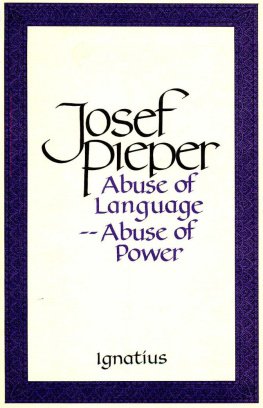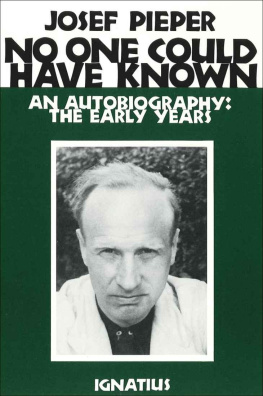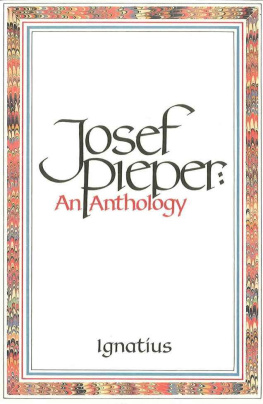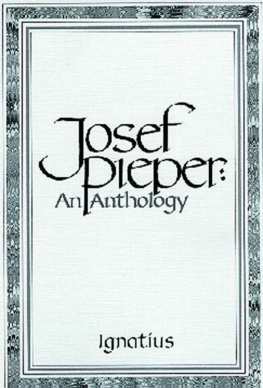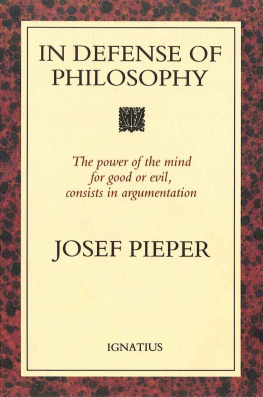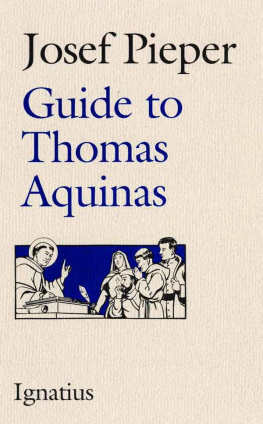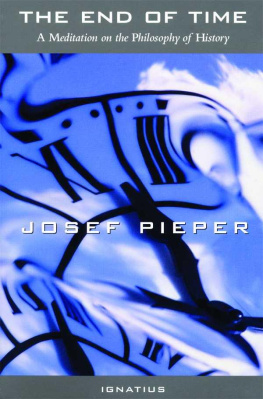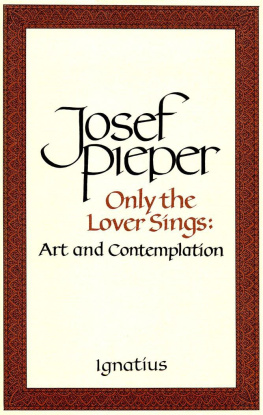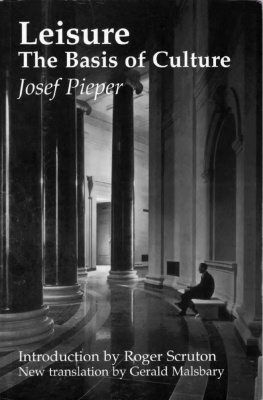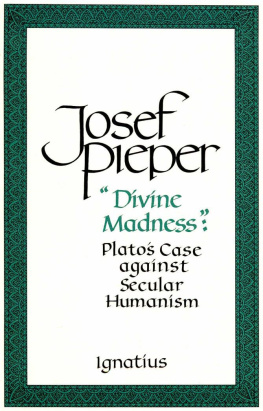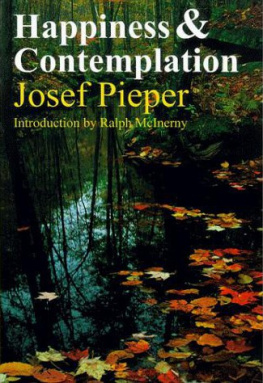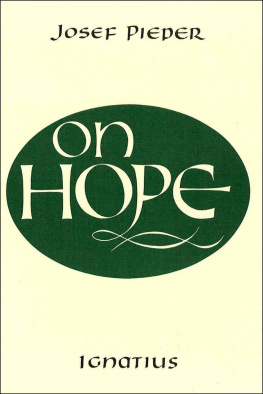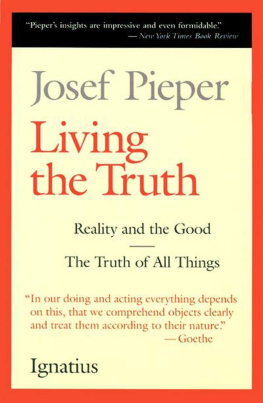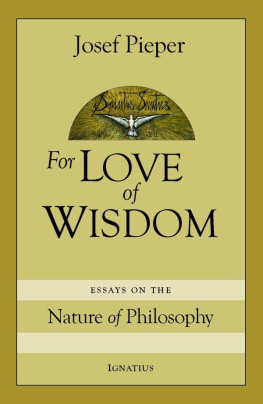One of the great Catholic philosophers of our day reflects on the way language has been abused so that, instead of being a means of communicating the truth and entering more deeply into it, and of the acquisition of wisdom, it is being used to control people and manipulate them to achieve practical ends.Reality becomes intelligible through words. Man speaks so that through naming things, what is real may become intelligible. This mediating character of language, however, is being increasingly corrupted. Tyrrany, propaganda, mass-media destroy and distort words. They offer us apparent realities whose fictive character threatens to become opaque. Josef Pieper shows with energetic zeal, but also with ascetical restraint, the path out of this dangerous situation. We are constrained to see things again as they are and from the truth thus grasped to live and to work.
ABUSE OF LANGUAGE, ABUSE OF POWER
JOSEF PIEPER
ABUSE OF LANGUAGE ABUSE OF POWER
Translated by Lothar Krauth
IGNATIUS PRESS SAN FRANCISCO
Title of the German original: Mibrauch der Sprache Mibrauch der Macht First edition 1974, Ksel-Verlag, Munich This edition 1988 by Schwabenverlag AG, Ostfildern bei Stuttgart
Cover design by Roxanne Mei Lum Cover border by Pamela Kennedy Calligraphy by Victoria Hoke Lane
1992 Ignatius Press, San Francisco All rights reserved ISBN 0-89870-362-x Library of Congress catalogue card number 90-85240 Printed in the United States of America
CONTENTS
Abuse of Language, Abuse of Power Knowledge and Freedom
ABUSE OF LANGUAGE, ABUSE OF POWER
T HE TOPIC OF THIS ESSAY can also be stated as "the abuse of language in its relation to the abuse of power". I intend to approach this subject from two different directions: though these are two distinct considerations, I shall nonetheless try to show their intrinsic connection.
One of these considerations is a phenomenon of classic antiquity, Plato's lifelong battle with the sophists, those highly paid and popularly applauded experts in the art of twisting words, who were able to sweet-talk something bad into something good and to turn white into black. They are those people whom Plato, in his Dialogues, puts in confrontation with Socrates. To be sure, historicity (don't worry!) is not my concern in this. It is rather Plato's position and this indeed is the other consideration which shall be taken as a paradigm showing, I believe, something directly relevant for us and our own situation today. The case can be made that Plato recognized, identified, and battled in the sophistry of his time a danger and a threat besetting the pursuits of the human mind and the life of society in any era.
Anything in what follows that may at first appear to be perhaps a mere historical description and interpretation should, therefore, in point of fact be taken as a commentary on the present. And further, then, anything that may at first sound like a mere critique of the present, aimed at our own situation, should also be taken as pointing to a timeless temptation that since the beginning of history has always required mankind's resistance and will require it forever. This timeless character of the sophistic phenomenon, transcending any particular age, prompted certain important, indeed disturbing, comments by Hegel. True, he called the sophists of Socrates' time "extremely refined and learned people"; but such praise, in Hegel's manner of speaking, sounds somewhat ambiguous. It is precisely such learned refinement, says Hegel, such absolute and unmoored questioning that plucks apart any object and dialectically discredits everything; it is such "refined reasoning" (gebildetes Raisonnement) an expression repeatedly used by Hegel that poses the true danger. It almost inevitably leads us, says Hegel, to the conviction that everything can be justified if we look hard enough for reasons. To quote Hegel: "You need not have advanced very far in your learning in order to find good reasons even for the most evil of things. All the evil deeds in this world since Adam and Eve have been justified with good reasons." Hegel, therefore, sees here a danger clearly intrinsic to the human mind, being part of its nature, a danger that can perhaps be overcome but never entirely avoided. And this danger could become all the more threatening, the more highly man's power of judgment, that is, his mental formation, is perfected. Granted, what the accepted monographs say about the sophists may indeed be correct: Werner Jger, for one, sees in the sophists "the earliest humanists"; they have been praised as great educators and teachers, as the first advocates for the freedom of thought, and so on. All this may well be entirely correct. And yet, it is precisely here where the danger lurks: only within the framework of those achievements can this specific destruction be wrought, a destruction that Hegel, too, has in mind when using the term sophistry. In this, the German philosopher is clearly siding with Plato. Both discuss something relevant beyond a specific era; both identify a danger threatening the human mind and commonweal at any time.
But, of course, it is not only the sophist phenomenon itself that thus may assume an updated and contemporary interest and relevance; and as the human mind progresses in terms of ever greater "sophistication", so also will the sophist phenomenon probably become ever more acute. "The sophists are not as remote to us as we may imagine", says Hegel. I wish to make this statement the implicit motto of my reflections here, this and Nietzsche's posthumous line, "The era of the sophists? Our time!" To repeat, then: it is not only the sophistic mentality itself that in this context arouses renewed interest but also, and even more so, Plato's argumentation, his contention with the sophists. Why, indeed, was he so dead set against the sophists? In what did he see their evil influence? What exactly did he feel they threatened? What is it, in Plato's opinion, that must never be sacrificed, under any circumstances, if man is to lead a truly human existence? Again: What did Plato have against the sophists?
The outward appearance of these men, as depicted in Plato's Dialogues, is sufficiently known. But there are rather obvious traits and others not so obvious, and some may only seem to be obvious.
To begin with, we notice the fact that these men are exceptionally successful, which every now and then prompts the sardonic admiration on the part of Socrates. He notices this merchandising of wisdom, this disregard of the essential difference between money and the spirit, as if there were no difference between what used to be called artes liberales, the liberal arts, and what we now call "mental work"; as if there were no difference between honorarium and wages. This consideration is much more relevant than may appear at first. Bertrand Russell, in his History of Western Philosophy, observes rather contemptuously that those professors should get down from their high horse when they denounce the sophists because they accepted payments; the professors themselves take money, he says, and quite a lot of it. But this still does not capture the crucial point. The crucial point, the incommensurability, is not mentioned here. A casual remark by Socrates is much more on target. The Cratylus dialogue, which incidentally also discusses the problem of language, deals with a certain question that for us here is of no consequence, and Socrates remains silent. Finally they ask him, "And what do you think, Socrates?" To which he replies, "I have no opinion on this, for I could afford only the five-drachma lecture of Prodicus [one of those great sophists!]. His fifty-drachma lecture I could not afford; had I been able to, then perchance I might be knowledgeable." Here the crucial point is made loud and clear.
A few years ago, one of Einstein's friends published some recollections in the Frankfurter Allgemeine, in which he relates, among other things, what Einstein had once told him: "An American university has offered me half a million dollars for the twelve original handwritten pages of my theory of relativity. This offer really bothers me. How can one sell the achievements of the mind!" And Sartre, in the Prsentation to the 1945 first issue of his magazine Les Temps Modernes, discusses the situation of the modern writer, indeed touching on many aspects but also on our specific subject. He says, "Why in the world are we ashamed, why do we blush, when money is mentioned? We simply receive our wages, as any other worker does!" Well, yes, a sonnet consists of fourteen lines. Will you be paid by the line, or by the hour, or by what standard? Maybe you needed only five minutes for it, maybe six months! The crucial point here is that money and mind are incommensurable. This has to be kept in mind, it seems to me, if this subject matter is to be discussed from Plato's standpoint.
Next page
